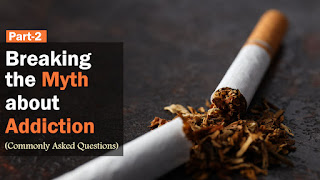Let’s break the stigma surrounding addiction and provide a safe space for healing, understanding, and a chance at redemption.
Here are 10 impactful, habit-breaking answers for the questions about alcohol and drug abuse:
Is alcohol really a magical solution to all our problems?
Alcohol is often misconceived as a solution to our problems, but in reality, it only masks the underlying issues. Instead of relying on alcohol as a crutch, it's better to seek healthier ways of coping, such as therapy or finding support from friends and family.
What are the consequences of snorting cocaine?
Snorting cocaine can have severe consequences on both physical and mental health. It can damage the nasal lining, cause respiratory problems, and lead to addiction. Additionally, long-term use can result in anxiety, paranoia, and even heart problems. It's crucial to understand the dangers and seek help to break the habit.
Is smoking weed truly a harmless recreational activity?
While marijuana may have some medicinal benefits, smoking weed for recreational purposes is not without its risks. Frequent marijuana use can impair cognition, memory, and motivation. Moreover, it can lead to dependency and hinder personal and professional growth. Breaking the habit can lead to a more fulfilling and productive life.
Are addicts really just weak-willed losers lacking self-control?
The perception that addicts lack self-control or willpower is a myth that perpetuates stigma and hinders their recovery. Addiction is a complex disease that affects brain chemistry and behavior. It requires empathetic support and evidence-based treatment rather than judgment or blame.
What are the dangers of mixing different drugs?
Mixing different drugs, whether prescription or recreational, can have lethal consequences. Drug interactions can lead to heightened intoxication, unpredictable side effects, and can even result in organ failure or death. It's crucial to avoid poly-drug use and seek professional help to break the cycle of drug abuse.
Is rehab really a luxurious vacation experience?
Rehab is often portrayed as a luxurious vacation, but this couldn't be further from the truth. While some facilities offer comfortable accommodations, the primary focus of rehab is to provide a supportive environment for individuals to overcome addiction. It involves intense therapy, group sessions, and dedicated efforts to break destructive habits.
Does alcohol truly make us the life of the party?
Alcohol might temporarily boost confidence and social inhibitions, but this notion that it makes us the life of the party is a misconception. Alcohol-induced behavior can often lead to embarrassing or harmful situations, strained relationships, and even legal troubles. Breaking the habit can result in more authentic and fulfilling connections with others.
Are prescription drugs a cost-effective alternative to doctor visits?
Relying on prescription drugs without proper medical guidance is dangerous and not a cost-effective alternative to doctor visits. Self-medication can lead to harmful side effects, drug dependence, and masking of underlying health issues. It's important to prioritize professional healthcare to address concerns effectively.
Can heavy drinking effectively alleviate stress and anxiety?
While some individuals may turn to alcohol to temporarily alleviate stress and anxiety, heavy drinking is not an effective long-term solution. Alcohol only provides temporary relief, and excessive consumption can lead to worsening mental health, increased stress, and addiction. Seeking healthier coping mechanisms, such as exercise or therapy, is essential for breaking the habit.
Is addiction a glamorous lifestyle choice?
Addiction is often glamorized in media, but in reality, it's a devastating disease that affects individuals and their loved ones deeply. Addiction can result in financial ruin, damaged relationships, legal issues, and even loss of life. Breaking the addiction cycle requires commitment, support, and professional treatment to lead a healthier and more fulfilling life.
Read Article Breaking the myth about Addiction Part 1



